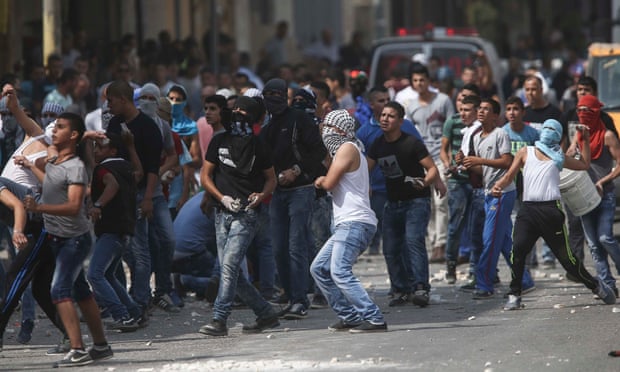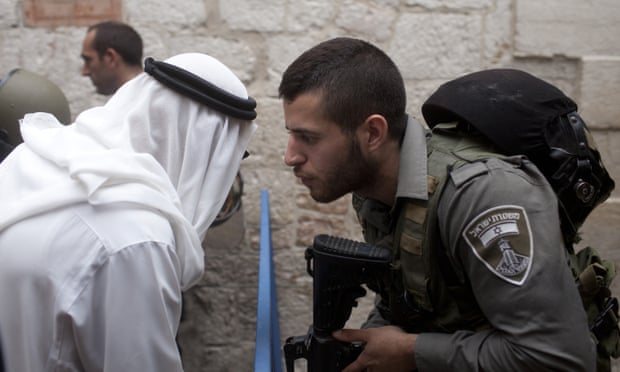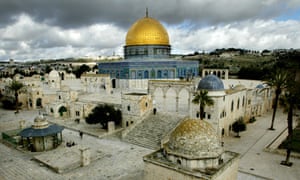Bibi cancels trip – to 'sit on a volcano'
Netanyahu cancels trip,1); 2) latest stabbings (not fatal) and return fire (1 lethal), Telegraph;

Palestinian protesters throw stones during a confrontation with Israeli soldiers in Ramallah on Tuesday, October 6th. Photo by Fadi Arouri/Xinhua Press/Corbis
Continuing violence in Israel forces Netanyahu to cancel German trip
Under-pressure prime minister convenes meeting of senior security advisers as clashes and killings persist
By Peter Beaumont in Jerusalem, Guardian
October 07, 2015
Binyamin Netanyahu has cancelled a trip to Germany amid continuing violence between Palestinians and Israelis.
A number of incidents on Wednesday scotched hopes the situation might be calming, after almost a week in which tensions have spiked amid clashes and lethal attacks.
The postponement of Thursday’s summit, which was to mark 50 years of diplomatic ties between Israel and Germany, came as Netanyahu convened his top security advisers to discuss the worsening situation.
Wednesday saw three separate serious incidents: in Jerusalem, outside Bethlehem, and in the southern Israeli city of Kiryat Gat, where a Palestinian reportedly stabbed an Israeli soldier and tried to take his weapon before fleeing into a building where he was shot dead.
Israeli policemen accompany members of the Zaka Rescue and Recovery team as they remove the body of a suspected Palestinian militant in the southern town of Kiryat Gat, Israel October 7, 2015. The suspect stabbed and wounded an Israeli soldier, snatched his gun and was then shot dead by special forces on Wednesday, police said, as a surge of violence prompted Israel’s prime minister to cancel a visit to Germany. Photo by Amir Cohen / Reuters
Video footage showed armed police and soldiers running towards a building, and then in a room standing over a body lying in a pool of blood. According to police, the suspect had approached an armed Israel Defence Forces soldier after stepping off a bus and attempted to snatch his weapon.
The Kiryat Gat incident will be especially worrying for Israelis, suggesting that the recent tensions – which had been largely confined to Jerusalem and the occupied territories – may be spreading to other parts of Israel.
It followed clashes on Tuesday night at a demonstration in support of the al-Aqsa mosque in the seaside town of Jaffa by Israelis of Palestinian origin.
The Kiryat Gat incident followed an alleged attempted stabbing by an 18-year-old Palestinian woman who was shot by an Israeli man during the incident, which took place in Jerusalem’s Old City, close to where two Israelis were stabbed to death at the weekend.
In the third incident, a female Israeli settler’s car was stoned near Beit Sahour, which adjoins Bethlehem, and other settlers apparently fired on Palestinians, seriously injuring a youth. The settler attacked in her car said that a group of Palestinian youths had tried to pull her from the vehicle at the time the shooting took place. According to the Ma’an news agency, which interviewed locals, the youth who was shot was a student involved in the attack on the car.
German government sources disclosed the cancellation of Netanyahu’s trip, which had already been heavily curtailed because of the situation in Israel and the occupied Palestinian territories. An Israeli official confirmed the cancellation.
Elsewhere, clashes between Palestinian demonstrators and Israeli security forces across the West Bank led to dozens of injuries among Palestinians, according to the Palestinian Red Crescent.
The most serious clashes occurred in the area of Beit El, east of Ramallah, and in the Nablus, Bethlehem and Jericho regions. In one incident, undercover Israeli officers who had infiltrated a group of Palestinian stone throwers shot and beat several men, injuring one seriously.
The mother of 13-year-old Palestinian boy Abdel Rahman Abeidallah, who was shot by Israeli troops during clashes on Monday, mourns over his body during his funeral in Bethlehem, October 6, 2015. Abeidallah was killed on Monday in a clash with Israeli soldiers near the West Bank town of Bethlehem, a Palestinian hospital source said.
The incident was captured on video by a local Palestinian agency and the Agence France-Presse news agency. According to an AFP witness, four masked men, one carrying a flag of the Islamist movement Hamas, were throwing rocks when others among them suddenly drew pistols. As the infiltrators grabbed and beat one man, they opened fire, while stones flew at them. One of the Palestinians was hit in the back of the head.
As evening fell there was no respite, with two further attempted stabbing incidents reported in Jerusalem and the central Israel town of Petah Tikva, where an Israeli man was injured at a shopping mall after being stabbed in the chest by a Palestinian who was restrained by other shoppers and arrested.
Police also arrested a 15-year-old Palestinian who they say pulled a knife and attempted to stab them when they approached him for questioning.
Four Israelis have been killed since Thursday in a stabbing and a drive-by shooting blamed on Palestinian militants. Police shot dead the Palestinian knife-wielder and the military arrested five members of Hamas for the shooting.
Two Palestinians, one of them a 13-year-old, have been killed and about 170 injured in clashes with Israeli soldiers in the West Bank since Sunday. Another Palestinian man, suspected of having stabbed and wounded an Israeli teenager, was shot dead by police in Jerusalem.
Amid the continuing violence, the Palestinian president, Mahmoud Abbas, moved to clarify recent statements from himself and the PLO executive committee regarding the violence. “I support a popular, nonviolent struggle and oppose all violence and use of weapons. I’ve made clear a number of times that I don’t want to return to the cycle of violence,” he told the Israeli daily Haaretz.
“We do not seek violence and have not sought to escalate it, but the aggression against al-Aqsa mosque and the worshippers in the mosque have led to this, and we are constantly trying to make sure it doesn’t intensify.
“I am prepared to act against violence and am taking steps in this direction, and the security apparatuses won’t use force or weapons but will maintain order. If there is no friction there will be no confrontation, and those who seek an arrangement will work to prevent friction and restore calm.”
Netanyahu has been under pressure from rightwing allies in his razor-thin coalition to respond forcefully to Palestinian unrest, but that could risk provoking the violent escalation of an already volatile situation.
As part of Netanyahu’s pledged steps to stem what he termed a “wave of terrorism”, Israeli forces destroyed the homes of two Palestinians involved in attacks last year.
Adding his voice to the mounting concern, the Israeli president, Reuven Rivlin, warned against religious incitement at the al-Aqsa mosque compound, or Temple Mount, saying his country and Palestinians were “sitting on a volcano”.
“Those who wish to turn the tragedy between us, Palestinians and Israel … into a religious war have blood on their hands,” Rivlin, whose post is mainly ceremonial, told journalists.

Israeli border police patrol patrol the Old City of Jerusalem. Photo by AFP/Getty
Jew stabbed by Palestinian woman inside Jerusalem’s Old City
Latest escalation in tensions between Israelis and Palestinians near Lion’s Gate entrance of Jerusalem Old City stokes fears of third intifada
By Inna Lazareva, Jerusalem, The Telegraph
October 07, 2015
A Palestinian woman stabbed an Israeli Jew in Jerusalem’s Old City on Wednesday, just hours after the lifting of restrictions on Palestinians entering the disputed Al-Aqsa Mosque compound brought in after last week’s fatal attack.
The 18-year-old Palestinian woman attacked the 35-year-old Israeli man with a knife near the Western Wall, close to the site of Saturday’s fatal stabbings which claimed the lives of two Jewish men.
The injured Israeli man then pulled out a gun and shot the assailant, seriously wounding her, Israeli police told The Telegraph. It was the third knife attack in the city in less than a week.
As clashes continued to spread across Israel and the West Bank, Israeli prime minister Benjamin Netanyahu cancelled a planned trip to Germany to deal with the ongoing violence in the country.
Earlier this week, German officials voiced fears of a “new Palestinian intifada”, urging both sides to condemn the violence and resume peace talks.
In a separate incident just hours later, a Palestinian assailant attacked an IDF soldier on a bus in the southern city of Kiryat Gat, stabbing him with a pair of scissors and grabbing his weapon. He was shot dead by Israeli security forces as he tried to flee.
In the West Bank, Israeli settlers slashed the tyres of Palestinian cars in Beit Iksa near Jerusalem, Palestine’s official Wafa news reported. Violent confrontations between Israelis and Palestinians also took place in Bethlehem and Hebron.
Near the Israeli settlement of Tekoa, Palestinian youths threw rocks at approximately seven cars belonging to Israelis. A 38-year-old woman who was injured when her windscreen was smashed said the Palestinian attackers attempted to lynch her from the car, Ynet News reported. A Palestinian teenager was shot and seriously injured in the incident.
On Tuesday evening, Israeli settler leaders were told there will be no additional settlement construction for now in the wake of the attacks.
“We were told that there is an inability to approve and advance construction under current pressures,” council chairman of the settlers’ Yesha Council Avi Roeh told reporters following the meeting.
“Strategically, it’s a serious mistake not to approve construction; it will harm the settlement [project] and in the end cause harm to Jerusalem and the entire state of Israel,” he said.
Unrest even reached the coastal city of Jaffa on Tuesday evening, where demonstrations against the clashes and police crackdown in Jerusalem became violent. Six Israeli policemen were injured.
Jerusalem’s Old City was quiet and tense on Wednesday, as many tourists stayed away, while police presence was high.

Jewish settlers accompanied by Israeli security guards walk past the Dome of the Rock during a visit to the Al-Aqsa mosque compound, Islam’s third holiest site which is also sacred to the Jews and known to them as Temple Mount, in the Old City of Jerusalem, on July 28, 2015. Photo by Ahmad Gharabli /AFP
Violence in Israel and the Palestinian territories – the Guardian briefing
Months of escalating tension, driven by the Israeli far-right and Jewish zealots on one side and frustrated young Palestinians on the other, have boiled over into clashes and lethal attacks. Can leaders on both sides contain the violence?
What’s happening?
Israel and the occupied Palestinian territories have been convulsed by a wave of escalating violence in recent days. The lethal tensions ratcheted up sharply last Thursday when a married couple, Jewish settlers from Neria in the northern West Bank, were shot and killed in a car in front of their four children near Beit Furik, allegedly by members of a five-man Hamas cell who were subsequently arrested. Two more Israelis were stabbed and killed in Jerusalem’s Old City on Saturday by a Palestinian youth, who was shot dead at the scene. On Sunday, an 18-year-old Palestinian was shot dead by Israeli forces in clashes near the West Bank town of Tulkarem.
On Wednesday a Palestinian woman stabbed an Israeli man who then shot and seriously wounded her in Jerusalem’s Old City, a Palestinian man allegedly stabbed a soldier in central Israel and stole his gun before being shot dead by police, while in the West Bank settlers shot and seriously wounded a Palestinian after a stone-throwing incident.
The mounting friction has seen attacks by settlers on Palestinians, clashes between Palestinians and Israeli security forces and attempted attacks continue. On Wednesday. there were incidents in Jerusalem, where a Palestinian woman stabbed an Israeli man who then shot and seriously wounded her in the Old City, the southern Israeli city of Kiryat Gat, where a Palestinian was killed after reportedly trying to seize a gun from a soldier and stabbing him, and when a female Israeli settler’s car was stoned near Beit Sahour, which adjoins Bethlehem, in an incident in which it appears other settlers fired on Palestinians, seriously injuring a youth.
On the Palestinian side, anger escalated earlier this week after a 13-year-old boy in Bethlehem’s Aida refugee camp was shot and killed by an Israeli sniper in an incident the Israeli military has claimed was “unintentional” as soldiers were aiming at another individual.
Why now?
Jerusalem has remained tense now for almost a year. Most analysts blame the recent heightened tension on several factors. Key among them has been the issue of the religious site in Jerusalem known to Muslims as al-Haram al-Sharif, or the Noble Sanctuary, and Jews as the Temple Mount.
A long-running campaign by some fundamentalist Jews and their supporters for expanding their rights to worship in the Al-Aqsa mosque compound on the Temple Mount, supported by rightwing members of Israeli prime minister Binyamin Netanyahu’s own cabinet, has raised the suspicion – despite repeated Israeli denials – that Israel intends to change the precarious status quo for the site, which has been governed under the auspices of the Jordanian monarchy since 1967.

The dispute over Al Aqsa mosque, formally under Jordanian control, has continued without resolution for several years. Here Israeli border police officers scuffle with Palestinian women in the Old City of Jerusalem, July 2015. Photo by AAP
Recent Israeli police actions at the site scandalised the Muslim world and raised tensions. Israel has also banned two volunteer Islamic watch groups – male and female – accusing them of harassing Jews during the hours they are allowed to visit.
That has combined with the lack of a peace process and growing resentment and frustration in Palestinian society aimed at both Israel and the Palestinian president, Mahmoud Abbas, and the Palestinian Authority.
Israel has complained in recent weeks of an increase in stone throwing and molotov cocktail attacks on West Bank roads and in areas adjoining mainly Palestinian areas of Jerusalem, where an elderly motorist died after crashing his car during an alleged stoning attack.
In response, Netanyahu and his cabinet have loosened live-fire regulations over the use of .22 calibre bullets on Palestinian demonstrators. Although described by Israel as “less lethal”, it is this type of ammunition that killed 13-year-old Abdul Rahman Shadi on Monday.
What are the leaders doing?
Part of the problem is the leadership on both sides. Netanyahu leads a rightwing/far-right coalition with the smallest of majorities. Several cabinet ministers support the settler movement and have publicly criticised him for not cracking down harder on Palestinian protest. Netanyahu’s weakness is reflected on the Palestinian side, where the ageing Abbas is seen as isolated, frustrated and increasingly out of step with other members of the Palestinian leadership, who would like a tougher line against Israel over continued settlement building and the absence of any peace process.
Violence in Israel and the Palestinian territories – the Guardian briefing
By Peter Beaumont in Jerusalem, Guardian briefing
Months of escalating tension, driven by the Israeli far-right and Jewish zealots on one side and frustrated young Palestinians on the other, have boiled over into clashes and lethal attacks. Can leaders on both sides contain the violence?
 An Israeli border policeman speaks to a Palestinian man near the scene of a stabbing in Jerusalem’s Old City. According to Israeli police, a Palestinian woman attacked an Israeli man with a knife. the man was carrying a gun and shot the woman. Photo by Lior Mizrahi/Getty
An Israeli border policeman speaks to a Palestinian man near the scene of a stabbing in Jerusalem’s Old City. According to Israeli police, a Palestinian woman attacked an Israeli man with a knife. the man was carrying a gun and shot the woman. Photo by Lior Mizrahi/Getty


